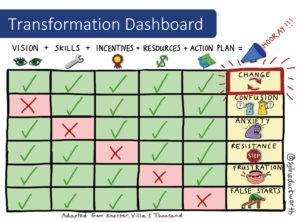![]() Transformation and in particular Digital Transformation appear to be the ‘ordre du jour’ for many organisations these days. Understandably, Transformation is a massive challenge for all organisations. If you think change is hard, try transformation.
Transformation and in particular Digital Transformation appear to be the ‘ordre du jour’ for many organisations these days. Understandably, Transformation is a massive challenge for all organisations. If you think change is hard, try transformation.
“Recognition of the need to think differently is the first-step to Transformation.”
If your organisation has already decided to embark on a transformation program, then you will be mindful of the obvious barriers to successful execution, such as:
- Lack of broad adoption
- Pockets of resistance
- Changing priorities
- Lack of measurable success from those parts of the business well down the road to transformation
- Lack of management focus, follow-up and/or follow-through
“Transformation begins with challenging the status quo.”
The Transformation Dashboard (see diagram) is a simple and powerful diagnostic tool that maps symptoms of Barriers to Transformation to causes of Barriers to Transformation, identifying where corrective actions should be considered. The more difficult barriers are less obvious and therefore often get totally overlooked. Think Business Performance KPIs
“You can’t improve what you don’t measure.” But are you measuring the right things?
I see this all too often working with IT Service Provider who are moving to the Cloud to become Cloud Service Providers and Managed Service Providers. KPIs are not considered and are unintentionally excluded from the transformation initiative. Essentially, this amounts to telling your people to march in a new direction into the unknown and the uncertain while rewarding them for marching in the old, known and certain direction. This is mismanagement by design. Question: Are your Business Performance KPIs aligned with your Transformation program?
“We live our lives responding to a world that we know and understand, but no longer exists.” – Eddie Obeng
Example 1: A recent example is ROI and ‘Cost of Ownership’ for customers considering acquiring new technology assets. These have become the go to KPIs. Both KPIs have universal acceptance and wide spread usage but have no utility when considering OPEX funded purchases. So, the million-dollar question becomes what are the cloud KPIs for ROI and ‘Cost of Ownership’ that were initially defined and used in the on-premise, asset-based world.? I believe they are consumption based for a subscription-based business; ‘Return on Spend’ and ‘Cost of Use’ or ‘Time to Value’.
“It is difficult to get a man to understand something, when his salary depends upon his not understanding it.” – Upton Sinclair
Example 2: Sales Compensation. A more difficult and highly sensitive issue is how to remunerate salespeople for cloud sales. Sales commission plans that were based on high ticket value asset sales no longer make sense in the world of monthly recurring revenues generated by subscription services. In addition, Digital Marketing and online customer education about Cloud services moves the work of sales to Marketing and to the Customer which compounds the problem of adequately and equitably rewarding salespeople for selling cloud-based services. Clearly if the compensation KPIs are not revised and aligned with the new business model of a subscription-based revenue Cloud services, sales resistance to selling cloud may stall the transformation effort. In some cases, resulting in the company actually reversing its decision (temporally) to go Cloud and deciding to continue selling traditional on-prem. asset-based IT services. i.e. unable to escape the gravitation pull of past and stuck in the status quo.
Take always:
Rethink, revalidate or replace your existing KPIs when you undertake a Transformation Program. When management tells its people to adopt change and align their behaviour to the new transformed business but continues to reward and incent people for the old behaviours conforming to the past then dysfunctional behaviour will result, frustration will go through the roof, morale will go through the floor and performance will stall.
Keep People Ineffective: KPIs that reward the old behaviour anchor people to the past and suppress new behaviour which accelerating time to failure for any Transformation initiative. If management fails to re-think, re-validate or replace the business’s current KPIs, then KPI takes on a new and perverse meaning: Keep People Ineffective.
Question: When was the last time you re-thought, re-validated or replaced your current business performance KPI’s?



Leave A Comment